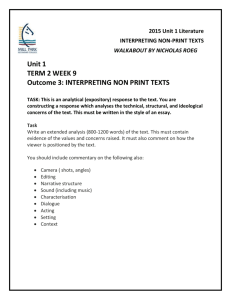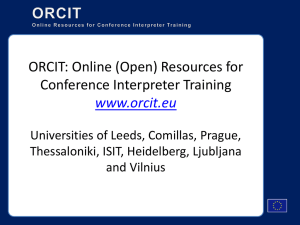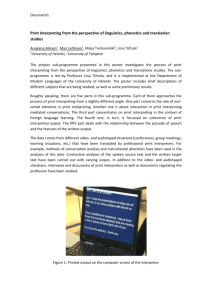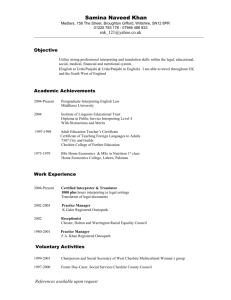FAQ Community Interpreting at the Mary Ward Centre
advertisement
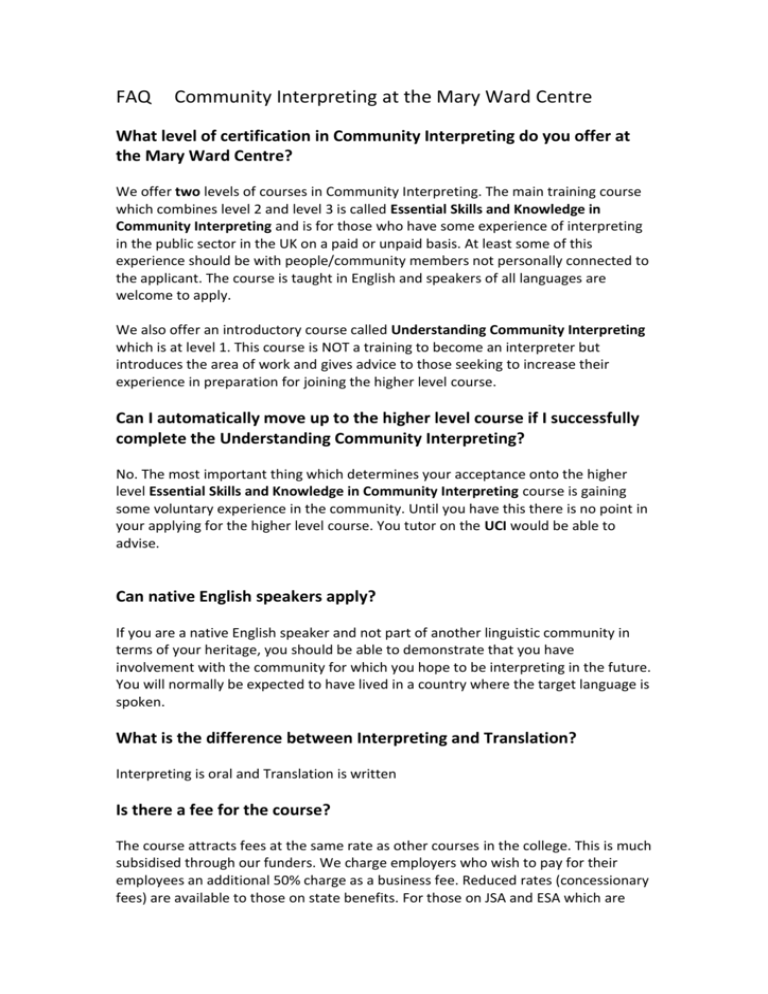
FAQ Community Interpreting at the Mary Ward Centre What level of certification in Community Interpreting do you offer at the Mary Ward Centre? We offer two levels of courses in Community Interpreting. The main training course which combines level 2 and level 3 is called Essential Skills and Knowledge in Community Interpreting and is for those who have some experience of interpreting in the public sector in the UK on a paid or unpaid basis. At least some of this experience should be with people/community members not personally connected to the applicant. The course is taught in English and speakers of all languages are welcome to apply. We also offer an introductory course called Understanding Community Interpreting which is at level 1. This course is NOT a training to become an interpreter but introduces the area of work and gives advice to those seeking to increase their experience in preparation for joining the higher level course. Can I automatically move up to the higher level course if I successfully complete the Understanding Community Interpreting? No. The most important thing which determines your acceptance onto the higher level Essential Skills and Knowledge in Community Interpreting course is gaining some voluntary experience in the community. Until you have this there is no point in your applying for the higher level course. You tutor on the UCI would be able to advise. Can native English speakers apply? If you are a native English speaker and not part of another linguistic community in terms of your heritage, you should be able to demonstrate that you have involvement with the community for which you hope to be interpreting in the future. You will normally be expected to have lived in a country where the target language is spoken. What is the difference between Interpreting and Translation? Interpreting is oral and Translation is written Is there a fee for the course? The course attracts fees at the same rate as other courses in the college. This is much subsidised through our funders. We charge employers who wish to pay for their employees an additional 50% charge as a business fee. Reduced rates (concessionary fees) are available to those on state benefits. For those on JSA and ESA which are considered as ‘active’ benefits the concessionary fee is much lower as the government funds these students to a greater extent. Mary Ward Centre, however, has agreed that we will continue to offer a subsidised fee also to those on other means tested benefits. For those who can prove low family income, there may be some help available through our charitable bursary fund. For further information see our website www.marywardcentre.ac.uk . Those eligible for regular fees will also have ‘home student’ status. This means that students will have been resident in the European Economic Area (EAA) for 3 years prior to the start of the course. If you are not an EAA citizen and have been resident in the EAA for the pupose of studying for any of the 3 years prior to the start of the course, you will not be entitled to home student fees. If you are from outside the EAA and are here as the spouse of a permanent resident, you are eligible for home student fees once you have been married and resident in EAA for 12 months. If you are not entitled to home student fees, the fee will be double that advertised in the prospectus. I don’t have much experience. Where can I get more experience? You need to research community organisations that work with speakers of your languages and be prepared to offer yourself as a volunteer with them. You should start with your Council’s website where you will find lists of community organisations that work with speakers of your language. You are advised not to say you particularly want to work as a volunteer interpreter-rather a general volunteer which will almost certainly lead to some interpreting once you become established. What level of language is needed to join the course? You should have native speaker competence in the target language and level 2 (Advanced level) in all skills in English. In certain circumstances you may be accepted onto the course with level 1 (Upper Intermediate) in written English only. Where a candidate has been brought up in the UK or came here when very young, there will be a test of their target language for either of the above courses, What is taught on the level 2/3 course? The course covers the issues and techniques needed by an interpreter working with the community. This includes issues of professional practice as well as the practical side of what to expect at an interpreting assignment and how to deliver the best service for the parties involved. There is also an introduction to the public services covered by this course-education, benefits, housing, social services, immigration and health. How are candidates assessed? Is there an exam? There is no exam on the course but students are expected to complete 3 assignments/units: 1) Interpreting practice which is assessed through roleplays completed in class and recorded as evidence for the moderator and the language assessor. 2) A bilingual glossary of terms from the public services translated into the target language. 3) A research into procedures in the public services and services available to the community. Each of these units can be assessed at either level 2 or level 3 (or no credit) but a working interpreter needs to aim for level 3 in all 3 units. Who will award the certificate for these courses? The courses are accredited through the Open College Network London Region (OCNLR) What work can the certificate lead to? Most interpreting agencies in London will accept level 3 in Community Interpreting as a working qualification. Most interpreters work in a freelance capacity and it is quite unusual to get enough work as a freelance interpreter to live off so perhaps useful to see this as one skill in a ‘portfolio’ of skills that you might use to work in the community. Can I work as a court interpreter with this certificate? This certificate does not cover interpreting in the legal field at all and to do this work you should complete the Diploma in Public Service Interpreting (DPSI) or the Metropolitan Police Language test. For further in formation see the website of the Chartered Institute of Linguists http://www.iol.org.uk/ Do you offer courses in written Translation? We offer a Translation course-Community Translation Principles and Practice. The course is offered twice a year and we select a limited range of languages in which to offer the course each time. Please see our prospectus for further information. You may register your interest in this course at any time as this will help us to select the languages to cover in future courses. What other courses can I do after finishing the interpreting course? Apart from the Diploma in Public Service Interpreting which is offered in some Further Education colleges, you may also wish, following successful completion of the level 2/3 you may like to continue to study the Bilingual Advocacy course which is run by the Mary Ward Centre and out partner, the WEA. Applicants for this course will have achieved at level 3. The WEA also offer a course for interpreters who wish to work in Child Protection. For further information please contact Phyllis Acosta on pacosta@wea.org.uk 23/06/2011
